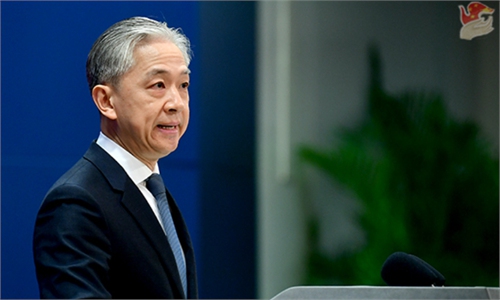

A view of a China-built zinc mine in Kazakhstan Photo: Courtesy of CCECC
As the China-Central Asia Summit scheduled for this week rapidly approaches, global observers are paying growing attention to economic cooperation between China and Central Asian countries - a region where the grand Belt and Road Initiative (BRI) was first proposed which also are the first batch of countries to join BRI.
This year also marks the 10th anniversary of the China-proposed BRI, and over the last decade, Central Asia has become a demonstration zone of how the BRI leads to win-win cooperation results - from a host of infrastructure connectivity projects helping the landlocked region linked with other regions, to energy and other trade that features a high degree of economic complementarity.
Observers said that concrete cooperation has helped strengthen strategic trust between China and Central Asian countries, laying a solid political foundation for BRI partnership to deepen in all aspects and inch toward more high-quality development, against the backdrop of rising geopolitical tensions.
The upcoming summit is expected to provide a blueprint for the advancement of existing BRI projects in Central Asia, which will bring more benefits for the region.
Fruitful cooperation results
"In the last 10 years, Central Asia has been of great significance to BRI and an indispensable part to the joint advancement of major BRI projects," Zhu Yongbiao, executive director of the Research Center for the Belt and Road at Lanzhou University, told the Global Times.
The region is the place where China proposed the BRI. Tajikistan was the first country in the world to sign a memorandum of understanding (MOU) with China on building the Silk Road Economic Belt, and to date, all the five Central Asian countries have joined the initiative.
According to Zhu, Central Asia also sits at an important strategic location in the Eurasian continent and is a key node along the BRI. It is an important logistics channel in linking Eastern Asia with Western Asia, Middle East and Europe, and a key passage way for the China-Europe Freight Train service, a flagship connectivity project under the BRI which has helped open up Central Asia to global markets.
"Central Asia and China are natural BR partners, in both geographical and development strategies. Their economies are highly complementary," Zhu said. He noted that there is a high degree of synergy between the BRI and the national development strategies of individual Central Asian nations, which underpins the latter's willingness to proactively seek more BRI opportunities.
Industry insiders said that one highlight of the partnership results is an effective boost in regional connectivity, displayed by the China-Europe Freight Train and the China-Kyrgyzstan-Uzbekistan railway, which is now at the stage of planning and conducting a feasibility study.
"Chinese companies have played a pivotal role in facilitating regional connectivity, involving railway and highways… which is consequential to increasing the development of regional economies and industries," China Civil Engineering Construction Corporation (CCECC) said in a statement sent to the Global Times.
The company, along with other Chinese companies, has jointly built a railway bridge and tunnel for Vahdat-Yavan Railway in Tajikistan that connects the middle and southern sections of the country's railway lines. The railway is an important part in constructing an international rail network from China to Tajikistan, Afghanistan and Iran, CCECC said.
Energy cooperation is another focal point, as exemplified by the China-Central Asia Gas Pipeline. It is China's first transnational gas pipeline and in 2022, it supplied 43.2 billion cubic meters of natural gas to China last year.
The total sum of China's direct investment in the five Central Asian countries has exceeded $15 billion by March this year, with the cumulative turnover of completed projects reaching $63.9 billion, a spokesperson for the Chinese Ministry of Commerce (MOFCOM) told a press briefing on Thursday.
High-quality growth phase
The China-Central Asia Summit, which is the first major diplomatic event to be held in China this year, will take place in Xi'an city, the capital of Northwest China's Shaanxi Province on May 18 and 19. Experts expect the landmark gathering to provide a key opportunity to review the fruits of cooperation and inject new momentum into BRI development in Central Asia.
The summit is expected to usher in a new era in closer China-Central Asia BRI cooperation, with high-quality development to be the main theme, Zhu said. Also, green BRI projects as well as "smaller cooperation" projects with tangible benefits, will be rolled out.
CCECC said that the company aims to continue systematic research on railway projects in Central Asia, "leveraging Chinese companies' whole-supply-chain advantage." It will also keep updating and participating in clean energy, water, and garbage disposal projects in the region.
The Power Construction Corp of China (PowerChina) said in a statement sent to the Global Times recently that the company will continue to invest in areas that elevate the electricity connectivity and water efficiency in Central Asia. PowerChina has been participating in the planning and construction of energy, power, and transportation projects in the region, ever since its entering the Central Asian market in 1999.
"There could be more third-market cooperation opportunities in the region. For example, China could work with Russia and Saudi Arabia to jointly expand markets in Central Asia," Zhu said.
He noted that deepening BRI cooperation with Central Asian countries carries special importance amid a shifting geopolitical landscape and fluctuating energy prices, and both sides need to guard against smears and instigations from the West in the next phase of development.
Chinese vehicle maker Zhengzhou Yutong Bus Co said in a statement sent to the Global Times that echoing the local government's vehicle industry plan, the company will scale up new energy push and help the electrification of the public transportation in Uzbekistan. Yutong delivered 800 buses to Uzbekistan recently, among which 300 are new energy buses.
China and Central Asian countries respect each other's choice of development path based on their respective conditions, support each other on issues concerning each other's core interests, and firmly oppose external interference in their internal affairs. Such political consensus is entrenched by years of fruitful cooperation, and will lay a solid foundation for closer BRI partnership, observers pointed out.



